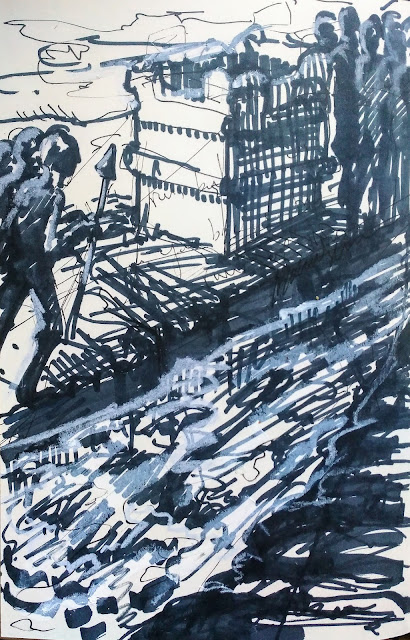And when you say No
I see my own face
disappear, like the waters
between us have washed me
away, a wave rolling
over my eye,
my mouth and its call
carried away on the current
your turned back a wall
encircling, and all I can do is
stare downward till
I vanish, leaving
only an echo
you don't want to hear.
Tuesday, March 13, 2018
Monday, March 12, 2018
Joshua: Chapter 22
What runs between us
can you bridge this river
of time?
[For full chapter, click here
This is a chapter that closes a circle--and an era--and inaugurates a new sense of history and nationhood.
After all the other tribes have "approached" to receive their allotment, Joshua at last "calls" the Eastern tribes: Reuben, Gad, and half of Mennasseh. These were the first of the tribes to swear obedience to Joshua, promising to be the shock troops that precede their brothers to battle. Now, at last, they are told that they can return home, tying together the beginning of the inheritance, inaugurated by Moses, with the rest of the inheritance, completed by Joshua.
Yet just as the circle closes, completing the story of the inheritance of the Land at the national center in Shilo, things fall apart. Upon returning to the banks of the Jordan--the liminal river that so defined Joshua's rise to leadership--the Eastern tribes build an altar. This seemingly innocent action is seen as a declaration of succession, an attempt to establish a rival national center.
In response, the nation acts as a single unit, sending a delegation of "one prince of a father's house, for all the tribes of Israel." They have learned well the lessons of history. Recalling the aftermath of the sin of Ahan, they declare that rebellion and succesion are not private issues. The nation is judged as a single unit. "You rebel today against God, and tomorrow he will be wrath on the whole congregation of Israel." Heading the delegation is Pinhas, the man who speared (literally) the response to "the iniquity of Peor", and with his action stopped the plague that ripped through the nation as a whole.
The Eastern tribes respond that mutuality runs both ways. If their actions will bring down punishment on the rest of the nation, the rest of the nation's possible rejection of their children will cause them to "cease fearing the Lord." In a situation where God judge's the nation as a whole, the nation's rejection of a part will bar access to God.
The altar, rather than being a rejection of the central altar at Shilo becomes an assertion of its importance, a linkage of the periphery to the center,]
Wednesday, March 7, 2018
Joshua 21: In Writing
We wheel
spokes leading in
a funnel that drops
down, down, down
where roads unfurl endlessly
winding between each house, each gate
and a street lies beneath each street
a city in a city
a yoke in a shell
waiting to splatter
the binder holding color together
spokes leading in
a funnel that drops
down, down, down
where roads unfurl endlessly
winding between each house, each gate
and a street lies beneath each street
a city in a city
a yoke in a shell
waiting to splatter
the binder holding color together
Subscribe to:
Posts (Atom)
